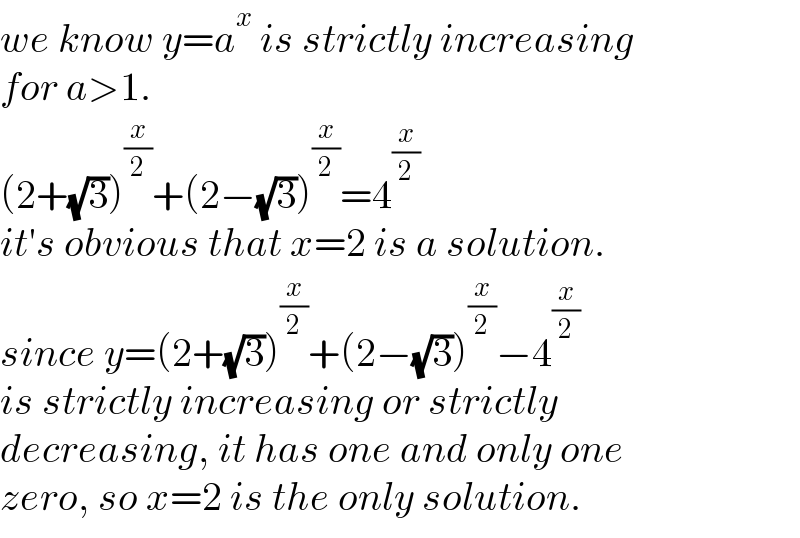
Question and Answers Forum
Question Number 180301 by Noorzai last updated on 10/Nov/22

Commented by MJS_new last updated on 10/Nov/22

Answered by MJS_new last updated on 10/Nov/22

Commented by peter frank last updated on 10/Nov/22

Commented by MJS_new last updated on 10/Nov/22

Answered by Rasheed.Sindhi last updated on 10/Nov/22
![((√((2+(√3) )/(2−(√3)))) )^x +1=((2/( (√(2−(√3))) )))^x ((√(((2+(√3) )/(2−(√3)))×((2+(√3))/(2+(√3) )))) )^x +1=((2/( (√(2−(√3))) ))×(((√(2+(√3))) )/( (√(2+(√3))))))^x (2+(√3) )^x +1=(2(√(2+(√3))) )^x (2+(√3) )^x −(2(√(2+(√3))) )^x +1=0 (2+(√3) )^x −(4(2+(√3) ))^(x/2) +1=0 (2+(√3) )^x −4^(x/2) (2+(√3) )^(x/2) +1=0 (2+(√3) )^(x/2) =y y^2 −4^(x/2) y+1=0 y=((4±(√(4^x −4)))/2)=(2+(√3) )^(x/2) 2±(√(4^(x−1) −1)) =(2+(√3) )^(x/2) LHS consist of two terms: non-radical & radical and non-radical=2 This is possible when (x/2)=1⇒x=2 and this satisfied also radical terms 2±(√(4^(2−1) −1)) =(2+(√3) )^(2/2) 2+(√3) =(2+(√3) )^(2/2) [ ∵2−(√3) =(2+(√3) )^(2/2) doesn′t satisy] ∴ x=2](Q180319.png)
Answered by mr W last updated on 10/Nov/22

